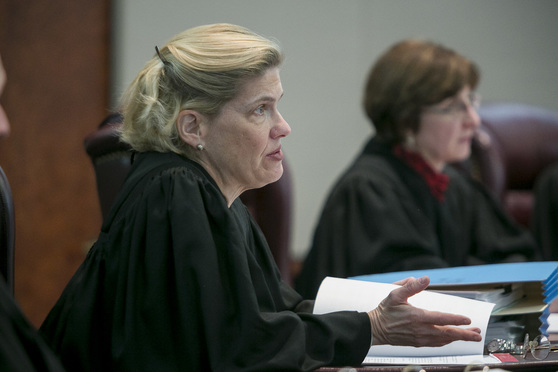Actual Harm Needed for TCCWNA Claim, Court Says in Certification to 3rd Circuit
The New Jersey Supreme Court on Monday delivered what appears to be largely good news to furniture companies defending federal consumer class actions, holding that actual harm is needed to make out claims under the New Jersey Truth-in-Consumer Contract, Warranty and Notice Act.
April 16, 2018 at 06:29 PM
4 minute read
 Justice Anne Patterson. Photo by Carmen Natale
Justice Anne Patterson. Photo by Carmen Natale The New Jersey Supreme Court on Monday delivered what appears to be largely good news to furniture companies defending federal consumer class actions, holding that actual harm is needed to make out claims under the New Jersey Truth-in-Consumer Contract, Warranty and Notice Act.
In a unanimous opinion issued in response to questions posed by the U.S. Court of Appeals for the Third Circuit, the court said sales or delivery contract terms that run afoul of regulations governing furniture delivery (such as “no refunds” language) can be the basis for claims under the TCCWNA. But in order to be considered an “aggrieved consumer,” a plaintiff must show there was actual monetary or other harm in order to become eligible for compensation.
“We hold that the inclusion of language prohibited [by regulations] in contracts of sale or sale orders for the delivery of household furniture may alone give rise to a violation of the … TCCWNA,” wrote Justice Anne Patterson for the court.
“We further hold that a consumer … who suffers no monetary or other harm … is not … entitled to a remedy under the TCCWNA,” she said.
The cases involved two consumers who claimed their sales contracts contained affirmative misrepresentations, prohibited by regulations contained in N.J.A.C. 13:45A-5.2 and -5.3. The first plaintiff, David Spade, filed a claim against Select Comfort Corp. The second, Christopher Wenger, filed a claim against Bob's Discount Furniture.
The lawsuits originally were filed in state Superior Court, but were removed to the U.S. District Court for the District of New Jersey. The lawsuits were dismissed by U.S. District Judge Peter Sheridan, sitting in Trenton.
The plaintiffs appealed to the Third Circuit, and that court asked the state Supreme Court for an interpretation of what it said were two unresolved questions of New Jersey law.
Consumer-rights and plaintiff bar amici backed the plaintiffs' position, while tort-reform and business groups supported the defendants, according to the decision.
On the first question, the court rejected the defendants' argument that an administrative violation can't give rise to a TCCWNA claim, The court concluded that “a furniture seller's inclusion in a consumer sales contract or agreement of language prohibited by N.J.A.C. 13:45A-5.3(c) may alone constitute a violation of a 'clearly established legal right of a consumer or responsibility of a seller' under [TCCWNA], and thus may provide a basis for relief under the TCCWNA.”
On the second question, Patterson, referring to statutory language, said: “In the absence of evidence that the consumer suffered adverse consequences as a result of the defendant's regulatory violation, a consumer is not an 'aggrieved consumer' for purposes of the TCCWNA.”
She added: “In the setting of these appeals, if a consumer has entered into a sales contract containing a provision that violated N.J.A.C. 13:45A-5.3, but his or her furniture was delivered conforming and on schedule, and he or she has incurred no monetary damages or adverse consequences, that consumer has suffered no harm.”
The court noted that it did not “view that harm to be limited to injury compensable by monetary damages,” Patterson wrote. “If, for example, a furniture seller fails to timely deliver a consumer's furniture, and the consumer would have sought a refund had he or she not been deterred by the 'no refunds' language prohibited by N.J.A.C. 13:45A-5.3, that consumer may be an 'aggrieved consumer' entitled to a civil penalty under [TCCWNA].”
Spade is represented by Lewis Adler, who heads a firm in Woodbury. He could not be reached for comment. Wenger's attorney, Andrew Wolf, who heads a firm in North Brunswick, said only that he was reviewing the ruling and could not comment.
Brett Carroll of the Boston office of Holland & Knight represented Bob's Discount Furniture. He issued a brief statement. “We are grateful for the Supreme Court's thorough consideration of this issue, which is of great importance to consumers and the retail industry alike,” Carroll said.
Select Comfort's attorney, Andrew Hansen, of the Minneapolis office of Fox Rothschild, was away from his office and could not be reached.
The case now returns to the Third Circuit for consideration.
This content has been archived. It is available through our partners, LexisNexis® and Bloomberg Law.
To view this content, please continue to their sites.
Not a Lexis Subscriber?
Subscribe Now
Not a Bloomberg Law Subscriber?
Subscribe Now
NOT FOR REPRINT
© 2025 ALM Global, LLC, All Rights Reserved. Request academic re-use from www.copyright.com. All other uses, submit a request to [email protected]. For more information visit Asset & Logo Licensing.
You Might Like
View All
Appellate Division Tosses Challenge to Rutgers Board Members That Ensnared NJ Lawyer
5 minute read
On the Move and After Hours: Einhorn Barbarito; Hartmann Doherty; Lowenstein Sandler; Lindabury McCormick
5 minute read

'A More Nuanced Issue': NJ Supreme Court Considers Appellate Rules for Personal Injury Judgments
5 minute readTrending Stories
Who Got The Work
J. Brugh Lower of Gibbons has entered an appearance for industrial equipment supplier Devco Corporation in a pending trademark infringement lawsuit. The suit, accusing the defendant of selling knock-off Graco products, was filed Dec. 18 in New Jersey District Court by Rivkin Radler on behalf of Graco Inc. and Graco Minnesota. The case, assigned to U.S. District Judge Zahid N. Quraishi, is 3:24-cv-11294, Graco Inc. et al v. Devco Corporation.
Who Got The Work
Rebecca Maller-Stein and Kent A. Yalowitz of Arnold & Porter Kaye Scholer have entered their appearances for Hanaco Venture Capital and its executives, Lior Prosor and David Frankel, in a pending securities lawsuit. The action, filed on Dec. 24 in New York Southern District Court by Zell, Aron & Co. on behalf of Goldeneye Advisors, accuses the defendants of negligently and fraudulently managing the plaintiff's $1 million investment. The case, assigned to U.S. District Judge Vernon S. Broderick, is 1:24-cv-09918, Goldeneye Advisors, LLC v. Hanaco Venture Capital, Ltd. et al.
Who Got The Work
Attorneys from A&O Shearman has stepped in as defense counsel for Toronto-Dominion Bank and other defendants in a pending securities class action. The suit, filed Dec. 11 in New York Southern District Court by Bleichmar Fonti & Auld, accuses the defendants of concealing the bank's 'pervasive' deficiencies in regards to its compliance with the Bank Secrecy Act and the quality of its anti-money laundering controls. The case, assigned to U.S. District Judge Arun Subramanian, is 1:24-cv-09445, Gonzalez v. The Toronto-Dominion Bank et al.
Who Got The Work
Crown Castle International, a Pennsylvania company providing shared communications infrastructure, has turned to Luke D. Wolf of Gordon Rees Scully Mansukhani to fend off a pending breach-of-contract lawsuit. The court action, filed Nov. 25 in Michigan Eastern District Court by Hooper Hathaway PC on behalf of The Town Residences LLC, accuses Crown Castle of failing to transfer approximately $30,000 in utility payments from T-Mobile in breach of a roof-top lease and assignment agreement. The case, assigned to U.S. District Judge Susan K. Declercq, is 2:24-cv-13131, The Town Residences LLC v. T-Mobile US, Inc. et al.
Who Got The Work
Wilfred P. Coronato and Daniel M. Schwartz of McCarter & English have stepped in as defense counsel to Electrolux Home Products Inc. in a pending product liability lawsuit. The court action, filed Nov. 26 in New York Eastern District Court by Poulos Lopiccolo PC and Nagel Rice LLP on behalf of David Stern, alleges that the defendant's refrigerators’ drawers and shelving repeatedly break and fall apart within months after purchase. The case, assigned to U.S. District Judge Joan M. Azrack, is 2:24-cv-08204, Stern v. Electrolux Home Products, Inc.
Featured Firms
Law Offices of Gary Martin Hays & Associates, P.C.
(470) 294-1674
Law Offices of Mark E. Salomone
(857) 444-6468
Smith & Hassler
(713) 739-1250






